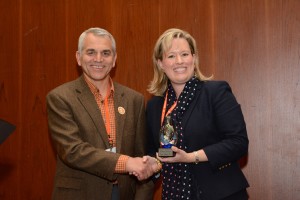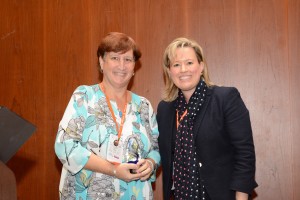Bridging the Gap STEM Education Conference
To view conference photos, click here.
More than 400 people from 53 North Carolina counties and five states attended NCABR’s fifth annual Bridging the Gap: Uniting North Carolina K-16 STEM Education conference Oct. 25-26 in Raleigh.
Inaugural STEM Education Awards
At the 2016 conference, NCABR bestowed its first-ever Distinguished Teaching Award in STEM Education to two K-16 educators who work in North Carolina. The inaugural recipients of the award were Rahman Tashakkori, Ph.D., Lowe’s Distinguished Professor in the Department of Computer Science at Appalachian State University; and Joann Blumenfeld, a high school teacher in the Wake County Public School System.

Rahman Tashakkori, Ph.D., (Appalachian State University) receives the Distinguished Teaching Award in STEM Education from NCABR President Suzanne Wilkison at BTG 2016.
 Joann Blumenfeld (Wake County Public School System) receives the Distinguished Teaching Award in STEM Education at BTG 2016.
Joann Blumenfeld (Wake County Public School System) receives the Distinguished Teaching Award in STEM Education at BTG 2016.
NCABR’s Distinguished Teaching Award in STEM Education is designed to recognize educators at the elementary, middle and high school levels and higher education faculty who have made extraordinary contributions to the field of science, technology, engineering and mathematics (STEM) education.
Attendees at the October 2016 conference were encouraged to apply for the 2017 awards. Those wishing to nominate an educator for the 2017 awards should submit an application to NCABR no later than March 31, 2017. Complete details are here.
Conference Agenda Highlights
More than 100 presentations and nearly 140 presenters from across North Carolina and beyond were a part of the 2016 conference. All corners of the STEM education community were represented — including K-12 education, higher education, industry, state government and STEM nonprofits such as museums and educational initiatives. To view the complete conference agenda, click here.
The program included inspiring keynote presentations by:
- Andrew Koch, executive vice president and chief academic leadership and innovation officer for the John N. Gardner Institute for Excellence in Undergraduate Education, who spoke on the topic of “Gateway Courses: Barriers to Completion or Pathways to a Better Life?”
- Amy Podurgal with VitalSmarts, who discussed “The Five Crucial Conversations for Educational Excellence.”
- Andrés Ruzo, National Geographic Explorer and founder and director of the Boiling River Project, who discussed “Building Bridges: A Nat Geo Explorer’s Take on STEM, Exploration and Making an Impact.”
- Damon Tweedy, M.D., an assistant professor of psychiatry at Duke University Medical Center, a staff physician at the Durham Veteran Affairs Medical Center, and New York Times bestselling author of the book, Black Man in a White Coat: A Doctor’s Reflections on Race and Medicine, who discussed “STEM Pipeline Diversity: A Remedy for Health Disparities?”
Additional program highlights included:
- Presentations that addressed topics such as starting a STEM program; best practices in undergraduate teaching; developing industry and community connections; reaching low socioeconomic status, rural, urban and minority students; and creating collaborations that explore the interdisciplinary nature of STEM.
- Hands-on and outreach expo sessions.
- A dedicated exhibitor area with dozens of booths.
- “Exhibitor Showcase” sessions that provided an opportunity for attendees to connect with premium exhibitors and engage in hands-on activities using the most up-to-date STEM resources.
- Poster sessions that provided conference attendees with updated information about practical, quality STEM research representing a wide range of interests.
- The STEM Unconference, which brought together attendees with similar interests for presentations, workshops, demonstrations and discussions.
The 2016 Bridging the Gap conference was sponsored by the Biogen Foundation (presenting sponsor), along with the Burroughs Wellcome Fund; the North Carolina Science, Mathematics, and Technology Education Center; National Geographic Learning and Cengage Learning; Novozymes; the North Carolina Biotechnology Center; Davidson College; UNC Charlotte’s Research and Economic Development & the Charlotte Research Institute; Meredith College; N.C. State University College of Science’s The Science House; the Appalachian State University Office of Research; and North Carolina Central University.

